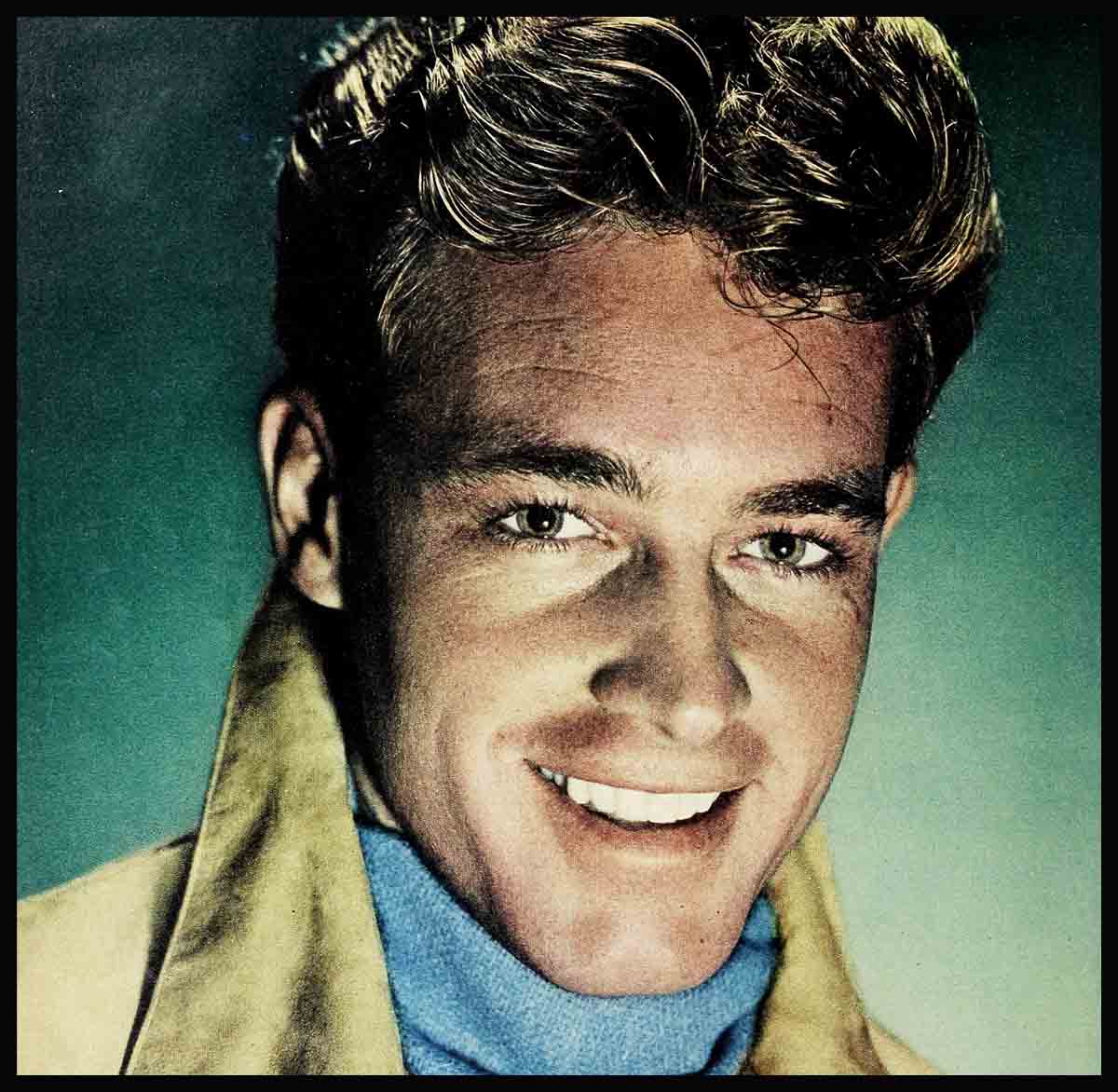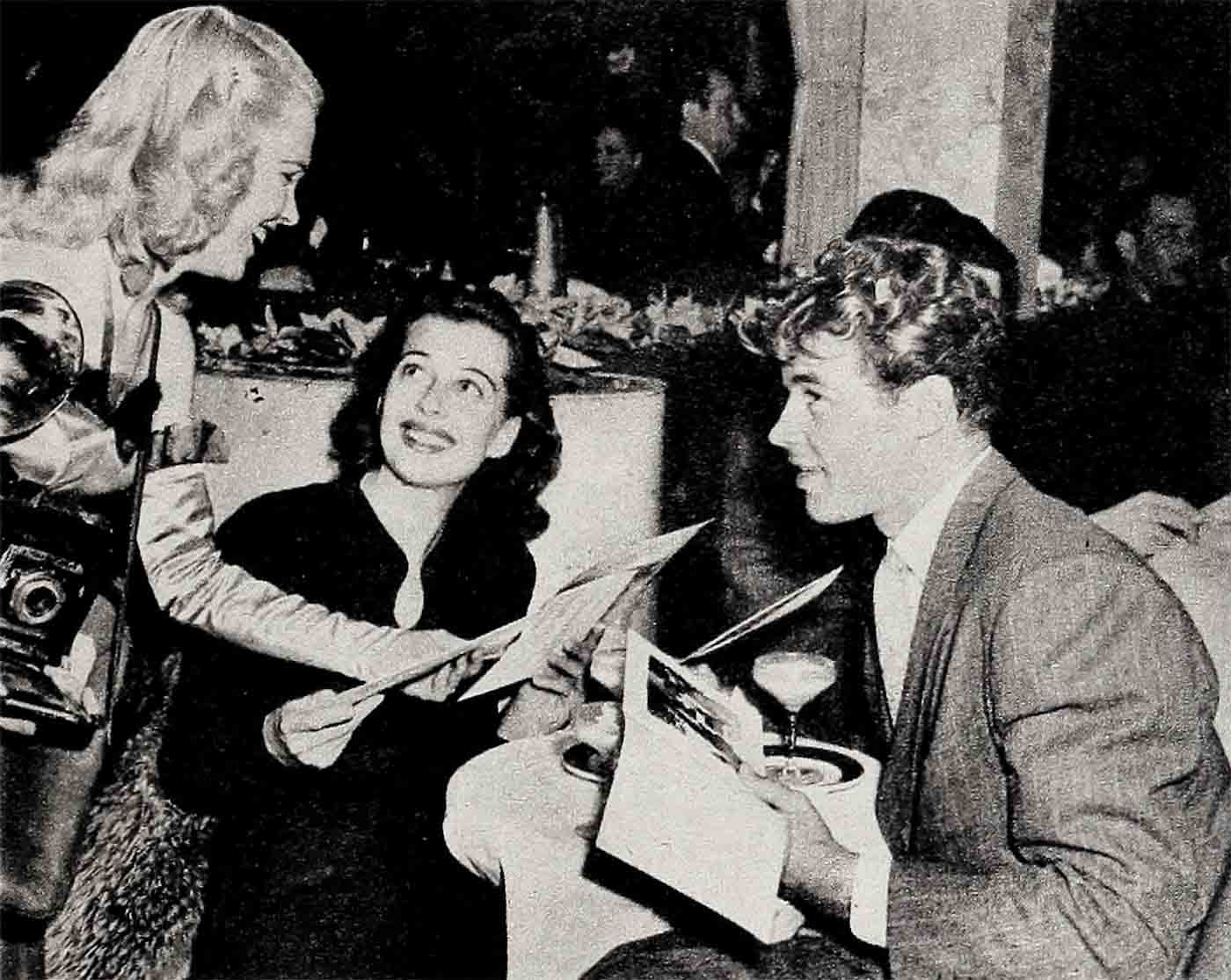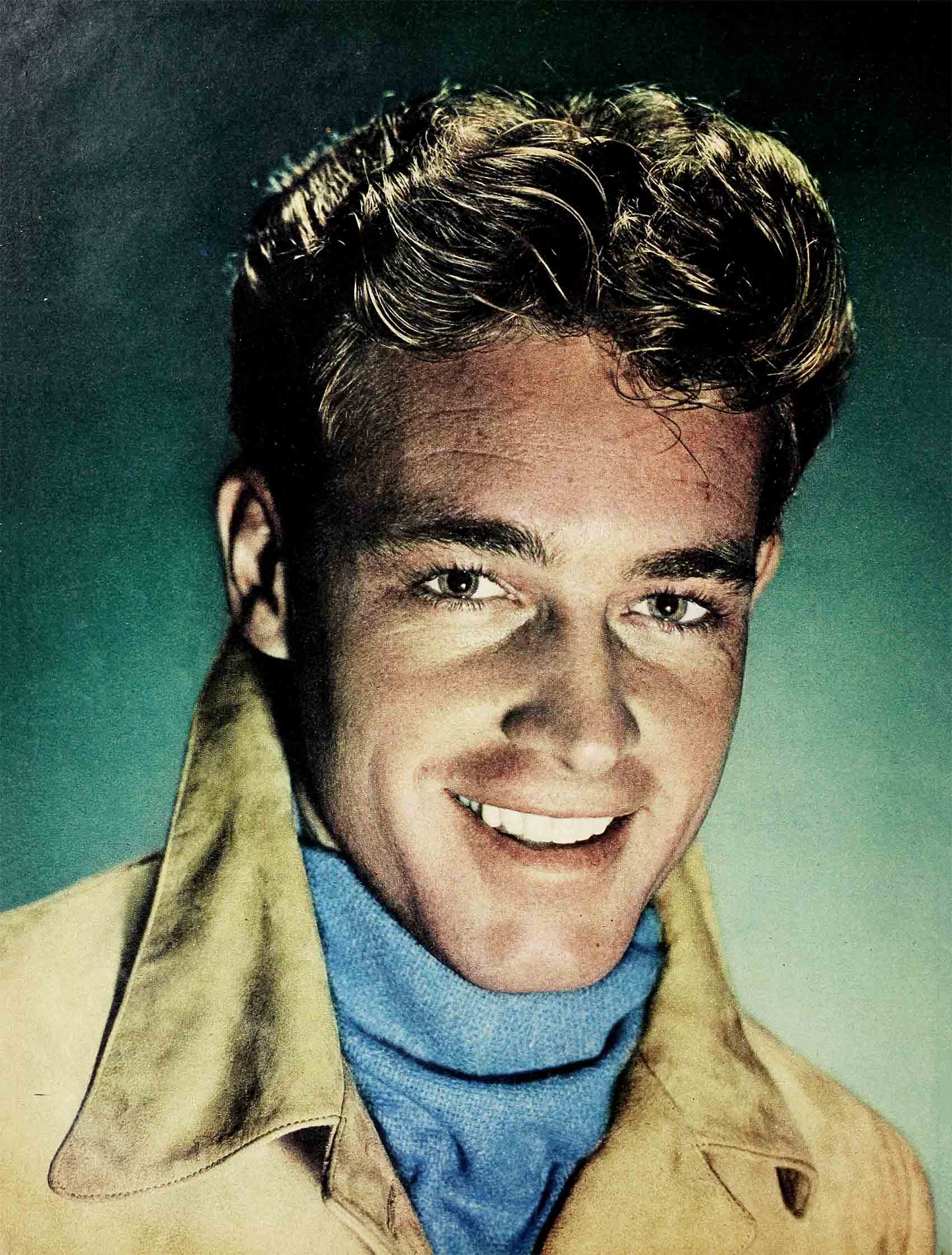
There Ought To Be A Wife—Guy Madison
Over a luncheon of roast pork, apple sauce, salad, milk, and no cigarettes, Guy Madison was being quite confusing. On the one hand (the one he used to wave at Jennifer Jones, let’s say, when she entered the commissary from the Portrait of Jennie set, wearing jeans under a camel’s hair coat) he was denying that he was married, engaged to, or going solo with Gail Russell—or any other girl. On the other hand, he was uncorking the most comprehensive “dream future,” complete with “dream house” layout, ever to come from the lips of a fellow who hasn’t got the girl picked yet.
Listen to him:
“The kind of a house I want is a rambling, redwood, California style place with lots of glass in the exterior walls for the view. But the only view I want is of my own land—five or six acres of secluded ground around the house. Going to have a couple of horses so there will have to be some pasturage for them. There will be a flagstone patio, flagstone walks and flagstone chimneys. I guess I like flagstone.
“Going to have my own freezing unit to store the meat from my hunting trips. That’s to tell you that I still hunt with bow and arrow, in case you forget to ask. I want a redwood den, a good practical kitchen, and I’m going to build the barI guess that will take care of us, all right.”
“Us? Who is us?”
“Why, I’ve got to have room for the four children I want, haven’t I?” He smiled, and showed he knew darn well he was skipping the obvious fact that there ought to be a wife involved in his plans somewhere, and that he wasn’t naming any such.
That’s when Gail’s name came up the first time. But the first time it didn’t take. Guy went on rambling:
“Now the interior of the house. I won’t have much to say about that except for a few things. There will be big fireplaces in the living-room and den. And there will be a lot of animal skins around. In fact, I will have a lot of the furniture upholstered with skins. And, oh, yes, there won’t be any dogs in the house. There will be dogs, but they will live outside.”

the great denial . . .
That’s when Gail’s name came up again. “Married to Gail?” Guy repeated, and you could tell by the look in his eyes that he considered it a very nice thought. But what he said was, “I have always denied it. Gail’s always denied it. The other night we had dinner at King’s and danced at Ciro’s and we took time out to deny it to each other. Gee, if I am her husband I do an awful lot of telephoning to date her. I ought to cut that out. I ought to call up some other girls. Maybe I do.”
Which brings up the fact that Guy’s bachelor friends say he enjoys going out with other girls, but he always hedges and won’t admit it. On the other hand, when they ask him how he feels about Gail’s going out with other fellows, he comes back with that old answer of the proud male: “All depends on what I’m doing that night.”
Guy wasn’t smoking, the day I had lunch with him. He was on the first month of no smoking after betting a friend fifty dollars he could quit. And everybody on the Selznick lot seemed to be checking him on it.
“Slipped yet?” queried Joe Cotten, as he came by the luncheon table.
“Nope,” replied Guy.
“That’s the boy,” Joe encouraged. “Just put your foot down; that’s the only way to stop smoking.”
Guy laughed. “Put your foot down, nothing,” he said. “You have to put the cigarette down!”
He isn’t kissing off nicotine just to win a bet, of course. His reasoning runs like this: “When I first came to Hollywood, I used to smoke only at parties or after dinner once in a while. Little by little, I got to wanting a cigarette all the time, it was like a crutch. I couldn’t do anything without them. That was too much.”
He has even tried to induce Gail to stop smoking, but when he told her she smoked too much, she flipped a stream of ashes into the air and quipped, “I like to smoke too much.”
The two are still seeing each other, still having their tiffs, and still making up. Gail has given Guy an oil painting outfit and he likes it, except that instead of painting with the brushes he uses old rags.
Guy still loves to hit the beach on his days off and Gail tolerates it, but not when she has an early morning studio call ahead of her the next day. The sand and grit in her hair are too much to combat.
And their plans? “No plans,” says Guy. “We’re happy the way we are. At least, I am. I got peace of mind without even reading one book on how to get it.”
Hollywood doesn’t always do nice things for a newcomer; it has for Guy. He was always pleasant, but hardly a conversationalist, and for this reason some people were inclined to class him as dull. He is a lot more comfortable now, with an ease of manner, and a bit of talent for banter which livens his talk attractively.
In other ways he is still true to the kid that he was; the kid that.came to Hollywood fresh out of the navy and celebrated the event by buying himself a wardrobe featuring an array of semi-draped suits; not the sharp stuff, you understand, but not on the square side either.
He has just bought himself a new car and it is not a convertible; it is a club coupe. It may have quite a bit of fancy trimming—but it’s not a convertible!
One of Guy’s youthful eccentricities caught up with him one day in Phoenix, . not long ago, during his Duel in the Sun personal appearance tour. Gregory Peck and Joe Cotten were on the tour as well, and one early evening they saw Guy slip out of the hotel. Calling a cab, they trailed him in the best thriller tradition.
Guy entered a grocery store, and through the window they watched him, apparently busy laying in stuff for a picnic. Curious, they decided to go in and ask him how come? Wasn’t he satisfied with the hotel food?
“Sure,” Guy told them, not a whit disturbed. “But what if I get a yen for a midnight snack?”
They howled at this and kidded him all the way back to the hotel. But at midnight, when Guy was in his room making himself a little snack, who do you think knocked on the door?

call of the wild . . .
When Guy was a boy in Bakersfield, his father worked for the Santa Fe Railroad in the locomotive maintenance section. Growing up, Guy was stirred by the call of adventure, but his call had nothing to do with railroading. And it certainly wasn’t the call of the theater. Acting was furthest from his thoughts. The closest he got to satisfying his vague impulse was going hunting.
When he got older, he still had no plans, but was pretty sure that his future lay away from Bakersfield. This hunch had something to do with his attitude towards the girls he met in town. He went out with them, danced with them, took them to the movies, but held off from “going steady.” If and when the road ahead opened up clearly, he wanted to be free to take it without hurting anyone.
Somehow, during this period of waiting, he formed a pattern of character that is still with him; an ability to be himself and wait for what lies ahead. His faith is not so much in his future, as it is in himself. For instance, he thinks it isn’t too important that there is much to acting that he doesn’t know. What is important is his conviction that he can learn it.
Guy hasn’t made a picture for some time now, yet he exhibits no nervous hurry about getting started again. A lot of the past year was taken up by the Duel personal appearance tours, and what other time he had left he was anxious to spend with his dramatic and diction coaches, Lester Luther and Florence Cunningham, The more knowledge he acquires now, the better his work when he steps before the camera again, he feels.
When he got back from his personal appearance tour and no picture was set for him, Guy took off for a hunting trip to Ruby Valley in Nevada. With him went Howard Hill, his archery mentor and pal, and Kenny Von Zell, of the radio Von Zells. Harry is Kenny’s father. The boys had a cabin in Ruby Valley, but otherwise roughed it. When Guy was nominated to cook the breakfasts, he dragged his sleeping bag into the kitchen to be close to his work. Hill handled the evening meals, and Kenny the chores in between.
There was a bit of social life as well—a country dance in the schoolhouse at Ruby Valley. Guy was invited to drop in. He did. He “dropped in” when the dance started, and didn’t drop out until six hours later when it was over. In that time he’d danced with every girl present, and that took them all in from three to seventy.
They knew he was a movie star, but that wasn’t why he made an impression on one girl.
“You’re really a dream dancer,” she said. “It’s too bad you have to waste your time in Hollywood.”
“I don’t get it,” Guy said.
“Well, all the fellows in Hollywood dance well, I suppose,” she said, “so it’s no novelty to the girls there. But how about the rest of us in other parts of the country?”
When he got back from the trip, he took up life again in his newly-rented house in the valley. This isn’t the “dream house,” you understand, but there is a certain significance attached to it, nevertheless. In the first place, he upped and rented it about the time that rumors of his marriage to Gail were flying thicker than ever. In the second place, as he admits, it is too big for just himself and Wayne.
The house, an eight-room affair, is secluded behind a grove of trees on a hill in the valley. The living room is completely empty, not even a lamp, “which makes it hard for me to read,” Guy grins. Ditto one of the three bedrooms and ditto the den, excepting for a radio-record-player that Guy has going all the time.
The kitchen is fully equipped and so is the dinette—“a man has to cook his food and have a place to eat it, doesn’t he?” One of the bedrooms is done in blue, and it is here that Guy sleeps on the one article of furniture in it—an oversized bed that he had custom-made. In the clothes closet is his wardrobe but not his sling of bow and arrows. This he keeps in Wayne’s clothes closet in the latter’s bedroom.
There is not a chair anywhere in the house excepting in the dinette. Two keys, one for Guy and one for Wayne, make up the only other house possessions. If this isn’t a bit of a mystery, it will do until a better one comes along or until Guy cares to explain, which he doesn’t right now. At least, he isn’t answering a lot of questions which would seem natural under the circumstances, and some of which might run like this:
1. Did he rent the new house because he and Gail had planned an elopement which, for some reason, never came off?
2. Is that why the bedroom is done in blue—which is said to be Gail’s favorite color?
3. Is he hesitating about furnishing it further because the “understanding” is off and he knows he doesn’t want such a big place for himself?
4. Have he and Gail just postponed the date and is that why he is talking about a “dream house” that he wants to build?
Guy just laughed when I quizzed him, and, instead of answering the questions, started to tell a story of an incident which occurred during his Ruby Valley hunting trip. Seems they were driving along the bed of a dry lake when they caught up with a coyote. An expert shot, by the name of Skeets Moore, started shooting at the coyote from the back of the car.
“Sometimes, we’d get as close as a dozen feet from the animal,” Guy said, “but Moore missed and missed. But he kept on trying and finally got him on the twenty-fifth shot.”
What did that have to do with the house? Was Guy trying to say that getting the house was a take-a-chance-shot he made that missed, but that he was still trying?
He chuckled. “That Skeets Moore was sure sore when he kept on missing that coyote,” he said. “But you take me. I don’t get sore when I miss. I just keep plugging along. I’ll get there.”
Are you listening, Gail Russell?
THE END
—BY LOUIS POLLOCK
It is a quote. MODERN SCREEN MAGAZINE FEBRUARY 1948




